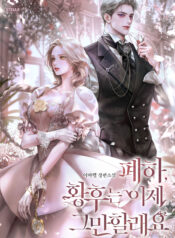They asked the Saint whether it was right for the people of the kingdom of heaven to pay taxes to the emperor who had conquered and colonized that land. If He said to pay taxes, it would acknowledge the emperor’s colonial rule, and if He said not to pay taxes, they planned to frame Him as a subversive element against the empire and execute Him.
Confident that it was an inescapable trap and triumphant, they could only retreat without saying anything after hearing what the Saint said.”
Madame Eleonor fell silent. She understood the hidden meaning of this story.
Mélisande continued the story.
“‘Render unto Caesar what is Caesar’s, and unto the Lord what is the Lord’s.'”
Mélisande clasped her hands as if offering a prayer. To someone who didn’t know, it would be an appearance worthy of praise as noble as a saint.
“Inner fruits, warmth, mercy, religious life—such noble heavenly things belong to the Lord, so we should give them to the Lord, but shouldn’t we separately take care of the secular emperor’s things?”
***
When the empress, who had been secluded in Belleair Anèx for health reasons, returned to the main palace, it was about three weeks before the founding festival.
While the empress was away from the main palace, Countess Fontaine, who was the maîtresse-en-titre with the emperor’s infinite tolerance—no, now that her husband had received a marquis title and she had risen to marchioness, she was Marchioness Fontaine. Anyway, she had been constantly showing off and strutting around.
To the extent that Elene complained, ‘I can’t stand seeing that woman showing off in front of my eyes,’ and even skipped the hawking gatherings she loved so much.
Whether his only princess was angry or not, the emperor had no intention of even giving a warning to the increasingly rampant Marchioness Fontaine, and only laughed heartily while watching her coquetry. Since quite a few officials’ heads had already been cut off by her pillow talk, newcomers began calculating that the real power in the palace lay with Marchioness Fontaine. Soon, in the flood of bribes and flattery, Marchioness Fontaine became even more triumphant.
With the empress she had mocked and checked gone, the next target that the triumphant Marchioness Fontaine seized to unleash her sadism was Mélisande, whom she pathologically hated.
Inevitably, she and Mélisande drastically reduced their social activities with the mindset of avoiding sh*t because it’s dirty. At least until the emperor cast out Marchioness Fontaine, they would have to watch her showing off everywhere. But for the time being, the emperor seemed to have no intention of casting her out.
The emperor was intentionally readjusting the balance of power in the court by empowering Marchioness Fontaine to reduce the power of Duke Este, the empress’s brother from her natal family, and strengthening the power of Duke Gascole, who stood behind Marchioness Fontaine.
If Duke Este, the focal point of the faction to which Levizet belonged, lost power, it was natural for the faction to helplessly disintegrate, so they had to endure somehow.
However, with the empress, the greatest power that could oppose Marchioness Fontaine, secluded due to health problems, the balance of the scales temporarily collapsed.
No matter how much influence she had in society as Mademoiselle Levizet, this was limited to among young people. What great thing could a ‘Mademoiselle’ who hadn’t even married do among the ‘Madames’ who ruled society? She just bit her lips in irritation.
What was at least comforting was that with Mélisande receiving the ‘Heart of Spring,’ no one could carelessly ignore her.
She almost fainted seeing the emerald shining on Mélisande’s chest when she returned with Mother last month.
The Heart of Spring, shining transparently in sunlight and emitting brilliant radiance. How did she obtain it? When she asked, Mélisande only answered innocently that Mother had given it as a gift. She suspected whether the sun had risen in the west, but Mother, who got off the same carriage as Mélisande, only said bluntly, ‘Know that I didn’t give it because I like you,’ and then left for Belleair Anèx where the empress was.
Thus, she was left in the main palace with Mélisande wearing the sparkling emerald without receiving any explanation. She could only guess that Mélisande had come up with some innovative policy after encountering the territorial financial reorganization plan that was delivered afterward, saying it would be used from the following year.
Anyway, the empress’s return at this point was fortunate. If the empress hadn’t returned by Founding Week, a war of nerves between Elene and Marchioness Fontaine over the right to host the founding banquet was emerging.
Originally, in the empress’s absence, the crown princess should have acted in her place, but the crown princess, being from a foreign country and not well-adapted to the empire’s social culture, willingly gave up the hostess’s glory.
It would have been more convenient if the emperor had openly taken someone’s side. If he had taken Elene’s side, they could have proceeded as is, and if he had taken Marchioness Fontaine’s side, they could at least protest based on court etiquette.
However, since the emperor just watched without taking anyone’s side, a pre-storm tension was circulating in Charity Palace.
Fortunately, with the return of Rauli Palace’s mistress, the situation was settled.
After the return that brought relief to some and disappointment to others, preparations for the founding festival banquet began, and the palace air became even busier.
Servants and maids running around with documents, workers carrying furniture, maids lighting rooms busy until late at night with candles. Their movements complexly intertwined and harmonized, making Rauli Palace feel like a giant beehive during the height of honey gathering. It seemed like the huge storm called the founding festival was sweeping through the palace.
However, the empress’s space located at the center was quiet like the eye of a storm.
Feeling somehow awkward in the quiet and cold silence she felt after a long time, she only stroked the door handle said to be modeled after the horn of plenty. She and Mélisande, who had been summoned by Mother, had just entered the ‘Ivory Hall,’ one of the empress’s spaces.
Among the many dining and reception rooms in Rauli Palace, being specifically summoned to the Ivory Hall—known as the empress’s dining room—was significant. Moreover, it wasn’t for a meal with the empress, but solely to call her daughter and daughter-in-law. Could this be taken as a sign that Mother’s favor toward the empress remained especially strong, even after stepping down as head maid?
True to its name, around the white marble table placed in the center of the Ivory Hall were arranged ivory sculptures so precise they seemed about to breathe and live. It could almost be considered a small art museum.
Her eyes caught the sculpture of the hunting goddess standing guard beside the door. Ivory sculptures modeled after symbols from ancient pagan mythology. She had been afraid of them in childhood. Now, well. Seeing icons of saints protecting the state religion hanging between the pagan sculptures was somewhat amusing. It wasn’t a venue for religious unification either.
Perhaps some unnamed empress who had been afraid of pagan sculptures like her childhood self had brought an icon. And her plea for the saints’ protection had strangely become tradition, with icons being added one by one over the years? She looked around while having idle thoughts. Mélisande, visiting the Ivory Hall for the first time, let out an exclamation of admiration.
“These are truly beautiful works.”
“You can look closely. But quickly, before Mother comes.”
Mélisande laughed softly and approached the paintings. She leisurely moved her feet following Mélisande, who was appreciating the paintings. From paintings by artists who only appeared in history books from over a hundred years ago to relatively recent paintings, they were evenly displayed. Mélisande stopped in front of one painting.
“Oh my, it’s Jeanne d’Ardennes.”
It was a painting depicting Saint Jeanne, the patron saint of the Ardennes region where Mélisande’s hometown, Boden Baronetcy, was located. It depicted with delicate brushstrokes the scene where Saint Jeanne in white clothes received God’s revelation to save the empire in crisis and arose.
In that era, only imperial family members or high-ranking clergy could afford to wear precious white clothes that required multiple dyeings. There was no way Saint Jeanne, who was a serf’s daughter, would have been wearing white clothes when receiving the revelation—it was a painting that ignored such historical facts and disregarded historical accuracy.
However, unlike the gloomily depicted background, the scene contrasting Saint Jeanne’s pure white clothes and blonde hair was quite impressive. Her firmly closed lips in a straight line were full of determination. Mélisande reached out and pointed to Saint Jeanne’s face.
“This painting somehow seems to resemble you, Alix.”
Normally, she would have dismissed this as her sister talking nonsense again with rose-colored glasses. Mélisande, who liked her too much for no reason, often made absurd claims that all sorts of beautiful things resembled her. But this time, the words were a bit difficult to dismiss as nonsense, so she smiled ambiguously. The reason was.
“You’re stating the obvious.”
Ah, the real model of this painting elegantly opened the door and entered.
“Since Alix is my daughter, it’s natural that she resembles me.”
***
The great-grandfather of Marquis Levizet, that is, Alix and Antoine’s grandfather, had a younger brother called an eccentric. The man called Philippe Levizet claimed he had already married scholarship, refused to marry at all, and shut himself away in the university, an academic research institution.
It didn’t matter. The heir to continue the family line was already secure anyway. Rather, many were more pleased by the fact that Philippe had voluntarily given up his rights, so they didn’t need to increase branch families and divide Levizet’s land for inheritance. Philippe’s existence, who lived quietly as a scholar never leaving Camargue University on the empire’s frontier as he wished and closed his eyes, was thoroughly forgotten by the family, politics, and society.
Until an unknown group calling themselves ‘Levizétiens’ appeared.
This began with a short piece Philippe Levizet had written for fun while drinking in his youth.
He wrote a two-page short essay mocking the stiff-necked aristocratic society with the argument that all humans, being God’s creatures, had some kind of naturally endowed equal rights, and Philippe’s associates were greatly alarmed and buried that writing somewhere. Thus the writing Philippe had scribbled while drunk seemed to die forgotten, not even remembered as having been born into the world.
- dorothea
feeling burnt out. updates for some novels will be slow please understand(ㅅ•́ ₃•̀)







